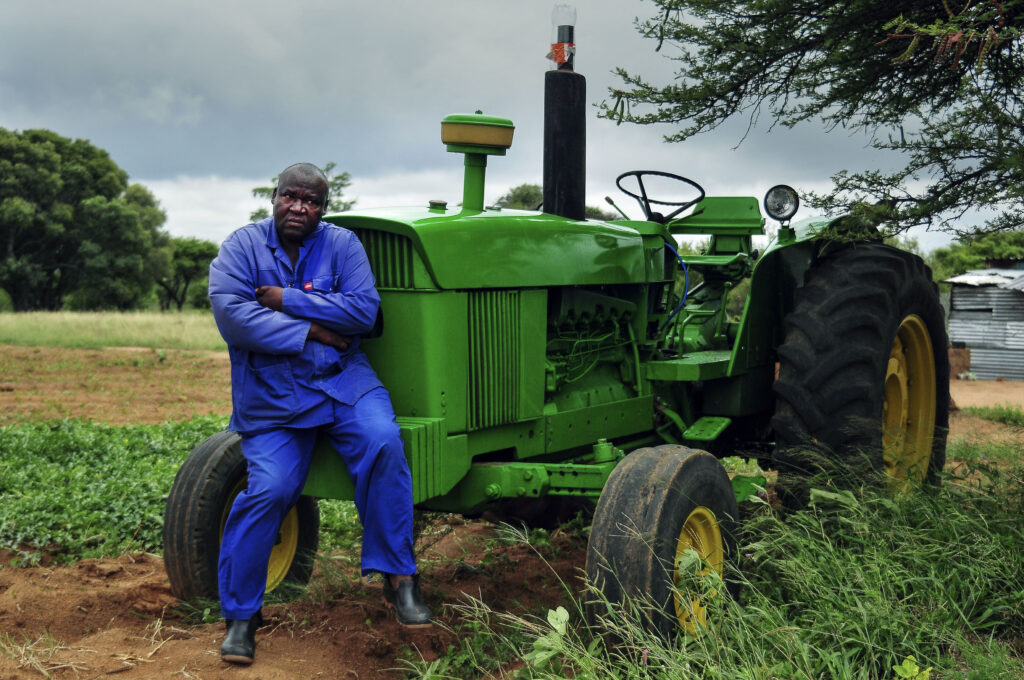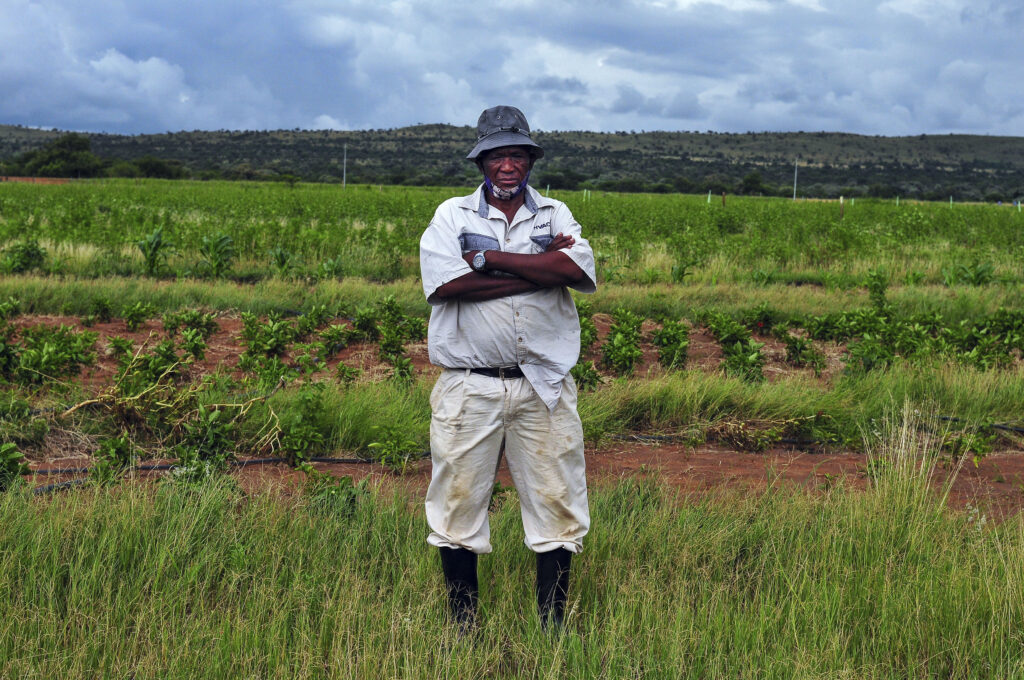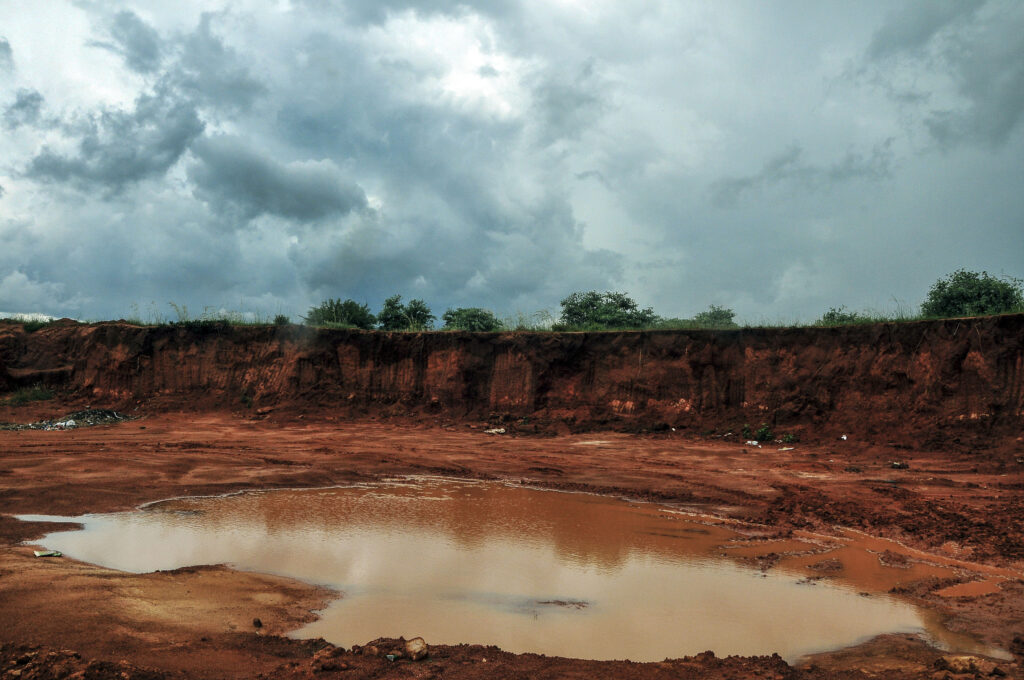Feeling helpless: Mmotoaneng community member David Aphane’s piggery was vandalised by land invaders. Photo: Lucas Ledwaba/Mukurukuru Media
A community of land claimants whose property is at the centre of a tug of war with land invaders, who claim to have bought plots from traditional leaders, has been forced to take matters into their own hands after different state organs have repeatedly failed them.
The land on Enkeldoorn farm near KwaMhlanga in Mpumalanga is part of a large tract that was successfully restored to the Mmotoaneng Community Trust through the land restitution process in 2019.
However, it is now the subject of a stand-off between the owners and land invaders, who have set up shacks on the land.
The Mmotoaneng are using the land for agriculture and have plans to expand their operations. The invaders, who are setting up shacks and cutting up plots even on the cultivated land, claim to have been sold portions for R5 000 each by representatives of the KwaManala Traditional Authority.
Illegal sand miners have also claimed to have been granted permission by the KwaManala Traditional Authority, and have also been accused of threatening the community of farmers.
 Land standoff: Land invaders who allegedly paid cash to a traditional leader have set up shacks on land restored to the Mmotoaneng community. Photo: Lucas Ledwaba/Mukurukuru Media
Land standoff: Land invaders who allegedly paid cash to a traditional leader have set up shacks on land restored to the Mmotoaneng community. Photo: Lucas Ledwaba/Mukurukuru Media
Farmer Phillip Nkopodi Nkoana pointed to a large area in the distance where the teeth of earth-moving machinery have left a gaping red scar where his grandfather’s homestead once stood.
David Aphane, the spokesperson for the Mmotoaneng Community Trust, said they approached the illegal sand miners, but were threatened with guns and told the land belongs to inkosi and that the Mmotoaneng have been paid by the state, so they had no claim to the land.
The Mmotoaneng Trust was paid R28-million by the Commission on Restitution of Land Rights for land that was found not to be restorable because it was already fully built up, occupied and included public places. The trust was given the rest of the land to use for farming.
Aphane’s piggery, located on one of the portions adjacent to the area where invaders have set up shacks, has been vandalised and stripped bare.
 Insulted by authorities: Farmer Philip Nkoana says land invaders have stolen his livestock and crops, but that the authorities have failed to act. Photo: Lucas Ledwaba/Mukurukuru Media
Insulted by authorities: Farmer Philip Nkoana says land invaders have stolen his livestock and crops, but that the authorities have failed to act. Photo: Lucas Ledwaba/Mukurukuru Media
Nkoana said he had been forced to move some of his farming operations to another portion of land after more than 12 cattle and 50 goats were stolen. He said vandals also removed fencing around a dam, which led to some of his cattle falling into it and drowning. He said he reported the matter to the KwaManala authorities, but he was insulted instead.
“We don’t know what to do any more, because no one seems interested to help us,” he said.
In June last year, the high court in Pretoria issued an interdict and restraining order against the KwaManala Traditional Authority, Chief Jabulani Mabena and Chief Makodhongo Mahlangu after an application brought by the Mmotoaneng Trust and its chairperson, David Mawela.
The court interdicted and restrained three of six respondents “from unlawfully allocating residential and/or any sites to their subjects and/or any third party on the property as described Farm Enkeldoorn 217 and allowing their subjects and/or any third party to unlawfully enter and occupy the said sites on the property belonging to the first applicant [Mmotoaneng Community Trust].”
It also ordered that KwaManala, Mabena and Makodhongo “refrain from declaring themselves the owners of the property described as Farm Enkeldoorn 217”.
The three other respondents are the Ndzundza Mabhoko Traditional Authority, Thembisile Hani local municipality, and the property’s unlawful occupiers.
Three months later, the Mmotoaneng Trust paid R8 466.30 in sheriff charges in an order signed by the acting sheriff, Maggy Phiri, in Groblersdal. Aphane said the sheriff has, however, failed to evict the illegal occupiers.
Sheriff Philip Phiri has not responded to queries about why the sheriff’s office had not carried out the order, despite having received the payment, and whether anyone had prevented them from evicting the illegal land occupiers.
Furthermore, the police have failed to act against the occupiers, despite several cases being opened. In desperation, the trust approached the South African Human Rights Commission (SAHRC) to intervene.
Aphane said officials from the SAHRC conducted an in-loco inspection on the property in November. But Mpumalanga SAHRC provincial commissioner Eric Mokonyama also failed to respond to repeated enquiries.
Mpumalanga police spokesman Brigadier Leonard Hlathi was asked why the KwaMhlanga South African Police Service (SAPS) failed to act after the trust opened three cases involving the matter. He, like the others in the others in the province, did not want to answer.
However, Aphane told the Mail & Guardian, a few days after our inquiry with Mpumalanga police, they had been contacted by the KwaMhlanga SAPS inquiring about the previous cases they had opened.
“There has been some activity, with police calling us wanting to reopen cases. We were surprised. They have also been responding, chasing those men with ‘stands for sale’ boards away. Otherwise, the invaded area is still like that, and the sheriff [is] still not acting,” Aphane said last week.
 ‘Nie nodig nie’: Farmer and land-claim beneficiary Petrus Tlhangi Mmako is worried about the effect of the invasions on his farming operation. Photo: Lucas Ledwaba/Mukurukuru Media
‘Nie nodig nie’: Farmer and land-claim beneficiary Petrus Tlhangi Mmako is worried about the effect of the invasions on his farming operation. Photo: Lucas Ledwaba/Mukurukuru Media
“Our community debated installing private security and trust that they will use force to counter the force used by the land thieves, as police clearly can’t handle them. Recently, the community is trying to mobilise our own strong men to challenge the men [allegedly] sent by the chiefs, and this seems to be the way to go. We are helpless as we watch while our land is being taken,” Aphane said.
The province’s spokesperson for the department of co-operative governance and traditional affairs, George Mthethwa, also did not respond to repeated inquiries about what action the department was likely to take after having been approached by the trust to intervene.
Thembisile Hani local municipality spokesperson Simphiwe Mokako said, “The municipality did not take any step because there was no relief sought against it in the notice of motion, including the court order.”
She said the land belongs to Mmotoaneng Community Trust, which is now private land and, therefore, the municipality cannot make any plans for private land.
“It is the responsibility of the Mmotoaneng Community Trust to evict the land invaders,” she said in response to the question of whether the municipality had a plan to deal with invasions on the property.
One of the Mmotoaneng farmers born on the land, Tlhaki Petrus Mmako, is worried that allocating residential stands on the land threatened their business and food security.
“Dit was nie nodig nie,” Mmako said about the setting up of shacks on land they intend to use for both crop and stock farming.
“People are building shacks on our fields. There will come a time when people have lots of money, but then there will be no food to buy with that money because shacks would have taken up all the farming land.”
Aphane said bands of men have arrived on the land in kombis and threatened the Mmotoaneng community while installing new tenants on the land. In January, one of the mobs allegedly hijacked a tractor sent to prepare the land for ploughing as part of the government’s assistance to small-scale farmers. Nkoana said the same men have also threatened him.
With the authorities failing to act in the stand-off, Aphane said the community is now forced to explore alternative options.
“We initially trusted that we have full protection [from the law] as the rightful claimants, until we realised that there seem to be bigger forces than we thought,” Aphane said.
 Competing claims: Illegal sand miners have also taken over a portion of the Mmotoaneng community land, claiming they were given the rights by the traditional authority. Photo: Lucas Ledwaba/Mukurukuru Media
Competing claims: Illegal sand miners have also taken over a portion of the Mmotoaneng community land, claiming they were given the rights by the traditional authority. Photo: Lucas Ledwaba/Mukurukuru Media
“First, the land claim commission required that we drive our claim through the courts; then, the local police seemed helpless and referred us to the traditional authority, where we were met with the challenge that they regard the land as belonging to the king. Then the fight for our land began as we sought help through all other agencies, including the [South African] Human Rights Commission, but every time our case seems to stall at some level.” — Mukurukuru Media
This article was possible due to the support of the German federal foreign office and the Institut für Auslandsbeziehungen (IFA) Zivik funding programme. The views presented in this article do not represent the views of the German federal foreign office nor the IFA.